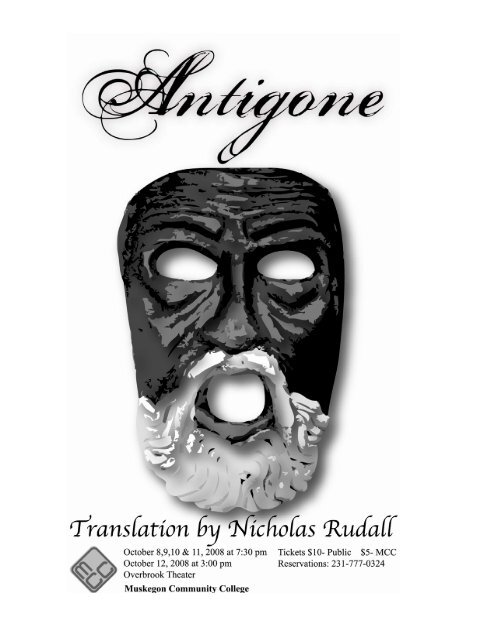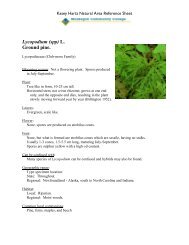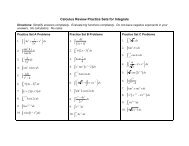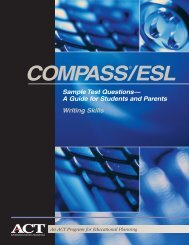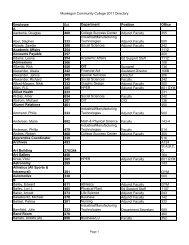Basic Information .3 - Muskegon Community College
Basic Information .3 - Muskegon Community College
Basic Information .3 - Muskegon Community College
You also want an ePaper? Increase the reach of your titles
YUMPU automatically turns print PDFs into web optimized ePapers that Google loves.
Table of<br />
Contents:<br />
<strong>Basic</strong> <strong>Information</strong> ............................................................ 3<br />
Playwright Biography ...................................................... 4<br />
Antigone’s Family Tree ................................................... 6<br />
About Antigone ............................................................... 7<br />
Character <strong>Information</strong> ..................................................... 9<br />
Major Themes................................................................. 11<br />
Short Summary............................................................... 13<br />
Quotations By Sophocles ............................................... 14<br />
Suggested Activities ....................................................... 15<br />
Bibliography .................................................................... 16<br />
2
This study guide is prepared in conjunction with the<br />
MCC Overbrook Theater production of Sophocles’<br />
ANTIGONE (translated by Nicholas Rudall )presented<br />
October 8, 9, 10, 11 and 12, 2008 in the Overbrook<br />
Theatre, <strong>Muskegon</strong> <strong>Community</strong> <strong>College</strong>, <strong>Muskegon</strong>,<br />
Michigan. Tickets available through the OBT Box Office<br />
at 231-777-0324 or room #166 on the MCC campus.<br />
Please note that a “Talk Back” session, which is a<br />
discussion between the audience and the actors<br />
following a performance, has been scheduled for this<br />
production. For specific information about the session<br />
or to request a Talk Back for a specific performance,<br />
please contact the Overbrook Theatre Box Office.<br />
For more information concerning this production and future MCC Overbrook Theatre Program<br />
events and productions, please contact the OBT Box Office or Sheila Wahamaki, Director, at<br />
231-777-0323 or via e-mail at Sheila.wahamaki@muskegoncc.edu.<br />
Study Guide<br />
This study guide was compiled with the intention of<br />
bringing more resources and further critical analysis to<br />
our audiences. Antigone is regarded as one of the<br />
greatest, most moving of all Greek tragedies. Written by<br />
Sophocles at the height of his powers. The play<br />
continues to have meaning for us because of its several<br />
themes: the conflict of ideas and character; the struggle<br />
between individual conscience and the authority of the<br />
state; the opposition of male and female natures; and the<br />
nature of human suffering.<br />
The background information found throughout this Guide<br />
should help to provide some context for the play and offer<br />
some insight into our production. The Suggested Activities that are found towards the end of<br />
the guide can be used in conjunction with the viewing of the performance to spur group<br />
discussion.<br />
Of course, while discussions and activities can enhance our understanding, there is no<br />
substitute for the live experience of this important play. We hope to see you at the theatre!<br />
3
Biography of Sophocles (496 BCE – 406 BCE (approx)<br />
As with all ancient writers, we can know little for certain<br />
about Sophocles' life: sources are few and far between,<br />
and much of the information scholars have reached is<br />
the result of probability and good guesswork rather than<br />
any biographical fact. Some of the sources directly<br />
contradict each other.<br />
Sophocles, usually considered the most accessible of<br />
the central triangle of Greek tragedians (the other two<br />
being Euripides and Aeschylus), was probably born in<br />
or around 496 BC at Colonus, near Athens, the setting<br />
of his Oedipus at Colonos (see, particularly, the Ode to<br />
Colonus in that play at 668ff).<br />
Sources tells us that Sophocles wrote 123 plays in his<br />
lifetime, of which we know the titles of 118. Of this huge<br />
output of plays (Shakespeare, in comparison, wrote<br />
somewhere between 36-39 plays in his lifetime) only<br />
seven survive: Antigone, Oedipus Rex (sometimes also<br />
called Oedipus Tyrannos, Oedipus at Colonos, Ajax, Electra, The Women of Trachis, and<br />
Philoctetes. The tiny size of this sample (around 6% of Sophocles’ total output) should be<br />
enough to discourage us from making generalizations about Sophocles’ style or development<br />
as a writer.<br />
All we know about Sophocles’ personality is from Aristophanes’ later play Frogs, which<br />
seems to suggest that Sophocles was extremely good-natured and well-liked. Dionysus, in<br />
that play, thinks Euripides a ‘scoundrel,’ likely to try and escape from hell, but Sophocles,<br />
because he was good-natured on earth, is assumed to be good-natured in Hades.<br />
His father, Sophillus, was not an aristocrat but rather a wealthy man, which meant that<br />
Sophocles was given an excellent education. The first real glimpse of him in the sources<br />
reveal that he was chosen after the defeat of the Persians to lead a boys’ choir in singing a<br />
paean around the trophy of victory, and further accompany the proceedings on the harp.<br />
Nothing more is known about Sophocles until he first appears as a tragic poet at one of the<br />
Athenian Festivals (see About Greek Theatre) in 468 BC (indeed, we have clearer records for<br />
these festivals than we do for Sophocles’ life story). He would then have been about twentyeight<br />
years of age, and was entering his first trilogy against the extremely well-renowned<br />
Aeschylus. Supposedly, the excitement at this festival was so high that the ten generals,<br />
rather than a jury drawn by lots, were asked to decide the winner. They chose Sophocles.<br />
From that point forward, Sophocles seems to have entered tragedies in the competitions<br />
something like once every two years, generally winning first prize. He won either eighteen or<br />
twenty-four first places at the City Dionysia, and never placed lower than second – and won<br />
several other prizes at the Lenaea. Oedipus Tyrannus, incidently, did not place first: the poet<br />
Philocles, on this occasion, won the prize (though it is possible that Philocles was entering<br />
4
using the tragedies of his uncle, Aeschylus, rather than ones he had himself written!). No full<br />
trilogy of Sophocles’ survives: the so-called ‘Theban Plays’, of which Oedipus Tyrannus is<br />
one, is not actually a full trilogy, and were not written in the order of their story, across<br />
Sophocles’ lifetime (Antigone comes first, Oedipus Tyrannus in his old age, and Oedipus at<br />
Colonos is only produced after Sophocles’ death).<br />
Sophocles is famously supposed by Aristotle in the Poetics to have added the third speaking<br />
actor to the Greek stage (probably sometime around 460: Aeschylus’ Oresteia [which<br />
requires three actors] follows two years later in 458 BC. Sophocles also supposedly<br />
increased the chorus size, even writing a treatise on the use of the chorus within the plays<br />
(which has not survived).<br />
The bond between Greek theatre and Greek society is also evident in Sophocles’ career. He<br />
was a senior administrator in the Athenian Empire, and elected to become one of the ten<br />
generals in charge of the military. He is also credited with introducing the cult of the healing<br />
god Asclepius into Athens: a result, perhaps, of the great plague that struck in the early years<br />
of the Peloponnesian War.<br />
For many years, a long tradition of criticism held Sophocles above both Aeschylus and<br />
Euripides, hailing his work as the apex of Greek tragedy. This conclusion, it might be said,<br />
has undergone considerable revision, and any such value judgment would today be shot<br />
down by classical scholars. That said, Aristotle praised him above all other playwrights, using<br />
Oedipus the King as a model for the perfect tragedy in his highly influential Poetics.<br />
Sophocles continued to write and serve in government well into his eighties. He died in c.406<br />
BC. And yet, despite leaving us only a small sample of seven complete plays, Sophocles still<br />
left a legacy powerful enough to make him one of the founding fathers of Western drama.<br />
5
Antigone’s Family Tree<br />
An understanding of Antigone's lineage is crucial to decoding the significance of the various<br />
characters' ultimate fates. Let's examine the major characters in the family tree below.<br />
Oedipus is a<br />
descendent of the<br />
Labdacus family,<br />
which is plagued<br />
with a terrible curse.<br />
Oedipus kills his<br />
father Laius<br />
inadvertently, not<br />
realizing who he is,<br />
and then proceeds<br />
to marry his mother,<br />
Jocasta, also not<br />
realizing her true<br />
identity. (For more<br />
on how this came to<br />
pass, see the<br />
summary of the first<br />
section of Antigone).<br />
As a result of<br />
Oedipus' marriage<br />
to Jocasta, he sires<br />
four children, who<br />
are at once his<br />
siblings and his<br />
children: Eteocles,<br />
Polyneices, Ismene,<br />
and Antigone.<br />
Oedipus, shamed by his marriage and murder, surrenders the kingdom to his brother Creon<br />
(since Creon is Jocasta's brother, he is also Oedipus' brother). Creon takes over the kingdom<br />
because it is feared that Eteocles and Polyneices are also cursed by the Labdacus plague<br />
and will continue bringing misery to Thebes. Eventually, however, Polyneices makes a claim<br />
on the Theban crown, causing him to be banished. At this point, Polyneices raises an army,<br />
returns to claim Thebes, and ends up dying at the hands of Eteocles, who dies in the fray as<br />
well. Creon remains in control of Thebes.<br />
Of this line, only Ismene and Antigone remain living at the start of the play. Antigone is<br />
supposed to marry her cousin Haemon, but by the end of the play, in a revelation that<br />
demonstrates just how widespread the Labdacus curse is - Haemon dies, Eurydice dies, and<br />
Antigone dies, leaving only Ismene and Creon as the de facto descendants of Labdacus.<br />
6
About Antigone<br />
The specific circumstances surrounding the origin of<br />
Greek drama were a puzzle even in the 4th century<br />
BC. Greek drama seems to have its roots in<br />
religious celebrations that incorporated song and<br />
dance. By the 6th century BC, Athenians had<br />
transformed a rural celebration of Dionysis into an<br />
urban festival with dancing choruses that competed<br />
for prizes. An anonymous poet came up with the<br />
idea of having the chorus interact with a masked<br />
actor. Later, Aeschylus transformed the art by using<br />
two masked actors, each playing different parts<br />
throughout the piece, essentially inventing Greek<br />
drama as we know it. With two actors and a chorus,<br />
complex plots and conflicts could be staged as never<br />
before, and the poets who competed in the festival<br />
were no longer writing elaborate hymns, but true plays. Athens was the only Greek city-state<br />
where this art form evolved; the comedies, tragedies, and dramas handed down to us from<br />
the period, although labeled generically as "Greek," are in fact all Athenian works.<br />
After the defeat of the Persians in a decisive campaign (480-479 BC), Athens emerged as the<br />
superpower of the independent Greek city-states, and during this time the drama festival, or<br />
the Dionysia, became a spectacular event. The Dionysia lasted four to five days, and the city<br />
took the celebrations seriously. Prisoners were released on bail, and most public business<br />
was suspended. Roughly 10,000 free male citizens, along with their slaves and dependents,<br />
watched plays in an enormous outdoor theater that could seat 17,000 spectators. On each of<br />
three days, the Athenians were treated to three tragedies and a satyr play (a light comedy on<br />
a mythic theme) written by one of three pre-selected tragedians, as well as one comedy by a<br />
comedic playwright. The trilogies did not have to be extended dramas dealing with the same<br />
story, although often they were. At the end of the festival, the tragedians were awarded first,<br />
second, and third prize by the judges of Dionysis.<br />
Although Antigone is grouped together with Oedipus the King and Oedipus at Colonus as a<br />
trilogy (sometimes called The Theban Plays or The Oedipus Trilogy), the three works were<br />
actually not written as a trilogy at all. It would therefore be totally erroneous to say that<br />
Antigone presents some kind of "final word" on the themes of the trilogy. In fact, although<br />
Antigone deals with the events that happen chronologically last in the myth, the play was<br />
produced in 441 BC - some 14 or 15 years before Oedipus the King, and a full 36 years<br />
before Oedipus at Colonus. Sophocles was clearly fascinated by the Oedipus myth, but<br />
inconsistencies in the events of the three plays seem to indicate that he wrote each play as a<br />
separate treatment of the story.<br />
For modern readers, the Chorus may be the most alien element of the play. Greek drama<br />
was not meant to be what we would consider "naturalistic." It was a highly stylized art form:<br />
actors wore masks, and the performances incorporated song and dance. The Chorus delivers<br />
much of the exposition and expounds poetically on themes, but it is still meant to represent a<br />
group of characters. In the case of Antigone, the Chorus is constituted by the Theban elders,<br />
7
old and powerful citizens of the city who watch and comment on the action. It interacts with<br />
the actors, and in Antigone the Chorus intercedes at a crucial point near the end of the play.<br />
Consistent with the norms of Greek drama, Antigone is not divided into acts or scenes. The<br />
action flows uninterrupted from beginning to end. However, time elapses in non-naturalistic<br />
fashion: at certain points, from reports of what has happened offstage, it is clear that a great<br />
amount of time is meant to have passed even though only a few minutes have passed for the<br />
audience. In general, as noted by Aristotle, the action of most Greek tragedies is confined to<br />
a 24-hour period.<br />
In his influential Poetics, Aristotle sets guidelines for the form of<br />
tragedy using Oedipus the King as his ideal model. Tragedy is<br />
usually concerned with a person of great stature, a king or<br />
nobleman, who falls because of hubris, or pride. There are<br />
unities of time, place, and, most importantly, action. Action may<br />
be thought of simply as motive or "movement of spirit": in<br />
Oedipus the King the action for most of the play is "find Laius'<br />
killer and stop the plague in Thebes." The action in Antigone is<br />
"preserve rightness and order in Thebes." Antigone is a strange<br />
case because the "movement-of-spirit" arguably comes from two<br />
directions: Antigone and Creon are both championing what is right,<br />
but they define rightness through different sets of values. Key<br />
elements include the moments of reversal and recognition,<br />
although not every tragedy has these moments. Reversal means a<br />
great and unexpected turn in events when the action veers around<br />
and becomes its opposite. Antigone experiences no reversal, but<br />
Creon does: at the Chorus' prodding, he finally backs down and<br />
listens to the advice he has been given, turning against the<br />
preservation of the kind of order he cherishes. Recognition means<br />
that a character gains sudden and transformative understanding of<br />
himself and the events he has experienced, moving from ignorance to knowledge. In<br />
Antigone, Creon finally recognizes that he has been misguided and that his actions have led<br />
to the death of his wife and son. Ideally, according to Aristotle, the reversal and the<br />
recognition hit at the same instant, as they do in Oedipus the King. While the Poetics are<br />
indispensable for the student of Greek drama - and, indeed, drama in general - Aristotle's<br />
theories should not be a straitjacket. Aristotle's guidelines make it difficult to appreciate the<br />
genius of Euripides, and by the standards of the Poetics, the great tragedies of Shakespeare<br />
would be failures. Aristotle is writing from a particular time and place, and he is also speaking<br />
from a very specific artistic sensibility. He may be the first word on Greek tragedy, but he is<br />
not the last.<br />
8
Character <strong>Information</strong><br />
Antigone: Antigone is both the daughter<br />
and the sister of Oedipus (since he married<br />
his own mother). Now that Oedipus and his<br />
brothers are dead, Antigone and Ismene<br />
are the last of the Labdacus family. After<br />
her father went into exile, Antigone and her<br />
sister were raised in the house of Creon.<br />
Her brothers Polyneices and Eteocles were<br />
casualties in a brutal war for power, each<br />
brother dying by the other's hand. Creon<br />
has declared that Eteocles will be honored<br />
with burial since he was a defender of<br />
Thebes, while Polyneices' body is left to the<br />
vultures and dogs. It is this edict that drives<br />
Antigone to defy the state, since she<br />
believes her brother Polyneices deserves the same treatment as Eteocles. Some critics see Antigone<br />
as too self-righteous, even alienating, but others claim her as a seminal feminist, determined to do<br />
what is right even in defiance of patriarchal law. Indeed, Antigone captured the public imagination<br />
immediately after the first performance of the play more than 2,500 years ago, as her deeds<br />
expanded the possibilities of human action, reconceived the role of women in society, and delineated<br />
a new type of character, one who sets her individual conscience and belief in divine principle above<br />
and against the power and authority of the state.<br />
Ismene: Antigone's last surviving sibling, Ismene is the foil for her stronger sister. In comparison to<br />
Antigone she has almost no agency, primarily because she is utterly terrified of disobeying men in<br />
power. She does not believe that women should ever violate the laws of men, since they are stronger<br />
and deserve subservience. Ismene does not help to bury Polyneices, but tries to claim responsibility<br />
for the burial later so that she can die with Antigone. Antigone refuses her help and Ismene is spared.<br />
This reflects both her great love for her family and her place as a symbol of the status quo who is<br />
rewarded for remembering her place.<br />
Chorus of Theban Elders: The Chorus comments on the action<br />
and interacts with Creon, actively interceding with advice at a<br />
critical moment late in the play. The Chorus is comprised of the<br />
Theban elders, vital for maintaining order in the city, and Creon<br />
summons them to win their loyalty. They watch the unfolding events<br />
with sympathy and a discerning eye: they pity Creon and Antigone,<br />
but also comment critically on their faults.<br />
Creon: The ruler of Thebes in the wake of war, Creon cherishes<br />
order and loyalty above all else. He cannot bear to be defied any<br />
more than he can bear to watch the laws of the state defied. He has<br />
Polyneices' body defiled while Eteocles is honored because he<br />
feels that he cannot give equal to share to both brothers when one<br />
was a traitor and the other was loyal. He does not recognize that<br />
other forms of justice exist, and in his pride he condemns Antigone,<br />
defies the gods, and brings ruin on himself.<br />
9
Watchman: The Sentry brings the news that Polyneices has been buried, and later captures<br />
Antigone. His speech is an interesting experiment in the history of Greek drama, as it attempts to<br />
approximate the rhythms and diction of natural speech. Similarly, his psychology reflects that of the<br />
simplest logic and reason - his only concern is preserving his life, and he asks basic questions,<br />
contrasting with Creon, Haemon, Ismene, and Antigone's lofty speeches on principles and ethics.<br />
Haimon: Haemon is the son of Creon and Eurydice and is engaged to be married to Antigone. In a<br />
dramatic dialogue with his father, Haemon defends the moral basis of Antigone's actions while<br />
warning his father that the people of Thebes sympathize with her determination to bury Polyneices.<br />
He and his father part in anger, as he simply asks his father to do what's right for Thebes, and his<br />
father stubbornly follows the path of least resistance. Haemon's devotion to Antigone is clear; at her<br />
death, he is so distraught that he tries to kill his father and then kills himself.<br />
Teiresias: Teiresias, or Tiresias, is a blind prophet<br />
who warns Creon that the gods do not approve of<br />
his treatment of Polyneices' body or the<br />
punishment of Antigone. Creon insults Teiresias,<br />
believing that he's simply blackmailing him for<br />
money, but the prophet responds with a prophecy<br />
foretelling the death of one of Creon's children and<br />
a warning that all of Greece will despise the king if<br />
he does not relent. Creon realizes that Teiresias<br />
has never been wrong and that he must do his<br />
bidding. The prophet is an important part of<br />
Sophocles' vision: through Teiresias, the will of the<br />
gods is made known, and his very existence<br />
implies that there is a definite will of the gods that<br />
is far above the domain of man's law.<br />
Messenger: The Messenger reports the suicides<br />
of Antigone and Haemon to the Chorus and<br />
Eurydice. He leaves to follow Eurydice when she<br />
runs off in grief.<br />
Eurydice: Eurydice is Creon's wife and Haemon's<br />
mother. Broken by her son's suicide, she kills<br />
herself, calling curses down on Creon for having<br />
caused the tragedy.<br />
10
Major Themes<br />
Pride: There is no question that pride, in the context of Antigone (and most of Sophocles'<br />
works), is a trait despised by the gods and punished without mercy. In Antigone, Sophocles<br />
describes the type of pride that allows men to create laws that substitute for divine principles.<br />
In other words, when Creon creates a law because he believes it is divine will, that is the<br />
ultimate display of punishable pride, for no man can ever create a law that is equal to or<br />
above divine right. As a result, when Tiresias comes with the news that Creon will suffer,<br />
Creon realizes that he has made a terrible mistake, and yet still refuses to admit it, bending to<br />
the prophet's message only because he wants to preserve his life, not because he knows<br />
he's gone too far. As a result, he must suffer the loss of his family.<br />
Individual versus State; Conscience versus Law; Moral or<br />
Divine Law versus Human Law: These three conflicts are very<br />
closely related, but this crude set of pairings helps to untangle some<br />
of the central issues of the play. Antigone and her values line up<br />
with the first entity in each pair, while Creon and his values line up<br />
with the second. Antigone continues to be a subversive and<br />
powerful play, and the inspiration for generations of rebels and<br />
dissidents. In the 20th century, a version of Antigone rewritten<br />
during the Second World War became one of the most powerful texts of resistance against<br />
the Nazis. The conflict between the individual and the power of the state was as pressing for<br />
Greek audiences as it is to modern ones. Antigone is a threat to the status quo; she invokes<br />
divine law as defense of her actions, but implicit in her position is faith in the discerning power<br />
of her individual conscience. She sacrifices her life out of devotion to principles higher than<br />
human law. Creon makes a mistake in sentencing her-and his mistake is condemned, in turn,<br />
by the gods-but his position is an understandable one. In the wake of war, and with his reign<br />
so new, Creon has to establish his authority as supreme. On the other hand, Creon's need to<br />
defeat Antigone seems at times to be extremely personal. At stake is not only the order of the<br />
state, but his pride and sense of himself as a king and, more fundamentally, a man.<br />
Gender: the Position of Women: Antigone's gender has profound effects on the meaning of<br />
her actions. Creon himself says that the need to defeat her is all the more<br />
pressing because she is a woman. The freedom of Greek<br />
women was extremely limited; the rules and strictures<br />
placed on them were great even for the ancient world.<br />
Antigone's rebellion is especially threatening because it<br />
upsets gender roles and hierarchy. By refusing to be<br />
passive, she overturns one of the fundamental rules of her<br />
culture. Ismene is Antigone's foil because she is completely<br />
cowed by the rule of men and believes that women should be<br />
subservient to them or risk incurring their wrath. Men are stronger, she says,<br />
and<br />
therefore must be obeyed. Ultimately, however, we see that she has merely bought into the<br />
problematic concepts that Creon espouses, for even when Creon realizes he may be wrong,<br />
he switches his defense, arguing that even if he were incorrect, he couldn't admit defeat to a<br />
woman, for that would upset divine law even more than backtracking on his principles. It is<br />
this fundamental untruth that Sophocles' play seeks to correct, mainly through the<br />
punishment that the Gods inflict on Creon as a result of his obtuse, misogynistic thinking.<br />
11
Inaction/Lack of Agency versus Agency: When faced with injustice, Antigone and Ismene<br />
react quite differently - the former aggressively, progressively, and the latter more<br />
conservatively. Ismene is not so much afraid of injustice as she is frightened of her own<br />
demise - and she cannot bear to incur the wrath of men for fear of being condemned to the<br />
same fate as the rest of her family. After watching her father and brothers die, she believes<br />
that the best course of action is to lie low and obey. In the case of Ismene, it seems inaction<br />
is tied to fear-at least until she willingly offers to die next to Antigone, at which point we<br />
realize that she is not so much inactive as she is unsure of her place as a woman. Thus,<br />
while Ismene is a figure characterized principally by doubt, Antigone is one who plunges<br />
ahead purely on self-belief and her firm convictions about right and wrong. Ultimately, then,<br />
because of these fundamental differences in philosophy, they cannot die together, though<br />
Ismene wants to. Antigone forbids it - she cannot bear to have her sister tag along when<br />
Ismene all along is in the camp of the patriarchs, despite her eleventh-hour shift.<br />
The Threat of Tyranny: Athenians, and particularly Thebans, were sensitive to the idea of<br />
tyranny and the fine line between a strong leader and a brutal tyrant. Creon is in many ways<br />
a sympathetic character, but he abuses his power subtly - mainly by decreeing man's law as<br />
a consequence of divine will. His faults do not necessarily stem from a lust for power, for he<br />
often has noble intentions. He is completely loyal to the state, but is subject to human<br />
weakness and poor judgment. Indeed, at the beginning of the play he frequently comments<br />
on his desire to do what's best for Thebes and gains the confidence of both Haemon and the<br />
Chorus of Elders, who say that they will follow him if that is his goal. And though he continues<br />
to reprise this theme, Creon is clearly more concerned with preserving certain values of law<br />
rather than the good of the city. When faced with a choice that would preserve 'tradition' or<br />
his own interpretation of the rule of law vs. a more progressive approach that does not follow<br />
precedent but clearly benefits Thebans, he chooses the former.<br />
12
Short Summary<br />
Polyneices and Eteocles, two brothers leading opposite sides in Thebes' civil war, have both<br />
been killed in battle. Creon, the new ruler of Thebes, has declared that Eteocles will be<br />
honored and Polyneices disgraced. The rebel brother's body will not be sanctified by holy<br />
rites, and will lay unburied to become the food of carrion animals. Antigone and Ismene are<br />
the sisters of the dead brothers, and they are now the last children of the ill-fated Oedipus. In<br />
the opening of the play, Antigone brings Ismene outside the city gates late at night for a<br />
secret meeting: Antigone wants to bury Polyneices' body, in defiance of Creon's edict.<br />
Ismene refuses to help her, fearing the death penalty, but she is unable to dissuade Antigone<br />
from going to do the deed by herself.<br />
Creon enters, along with the Chorus of Theban Elders. He seeks their support in the days to<br />
come, and in particular wants them to back his edict regarding the disposal of Polyneices'<br />
body. The Chorus of Elders pledges their support. A Sentry enters, fearfully reporting that the<br />
body has been buried. A furious Creon orders the Sentry to find the culprit or face death<br />
himself. The Sentry leaves, but after a short absence he returns, bringing Antigone with him.<br />
Creon questions her, and she does not deny what she has done. She argues unflinchingly<br />
with Creon about the morality of the edict and the morality of her actions. Creon grows<br />
angrier, and, thinking Ismene must have helped her, summons the girl. Ismene tries to<br />
confess falsely to the crime, wishing to die alongside her sister, but Antigone will have none<br />
of it. Creon orders that the two women be temporarily locked up.<br />
Haemon, Creon's son and Antigone's fiance, enters to pledge allegiance to his father. He<br />
initially seems willing to obey Creon, but when Haemon gently tries to persuade his father to<br />
spare Antigone, the discussion deteriorates and the two men are soon bitterly insulting each<br />
other. Haemon leaves, vowing never to see Creon again.<br />
Creon decides to spare Ismene and to imprison Antigone in a cave. She is brought out of the<br />
house, and she bewails her fate and defends her actions one last time. She is taken away,<br />
with the Chorus expressing great sorrow for what is going to happen to her.<br />
Teiresias, the blind prophet, enters. He warns Creon that the gods side with Antigone. Creon<br />
accuses Teiresias of being corrupt, and Teiresias responds that because of Creon's<br />
mistakes, he will lose one child for the crimes of leaving Polyneices unburied and putting<br />
Antigone into the earth. All of Greece will despise him, and the sacrificial offerings of Thebes<br />
will not be accepted by the gods. The Chorus, terrified, asks Creon to take their advice. He<br />
assents, and they tell him that he should bury Polyneices and free Antigone. Creon, shaken,<br />
agrees to do it. He leaves with a retinue of men to help him right his previous mistakes. The<br />
Chorus delivers a choral ode on/to the god Dionysis, and then a Messenger enters to tell<br />
them that Haemon has killed himself. Eurydice, Creon's wife and Haemon's mother, enters<br />
and asks the Messenger to tell her everything. The Messenger reports that Haemon and<br />
Antigone have both taken their own lives. Eurydice disappears into the palace.<br />
Creon enters, carrying Haemon's body. He understands that his own actions have caused<br />
these events. A Second Messenger arrives to tell Creon and the Chorus that Eurydice has<br />
killed herself. With her last breath, she cursed her husband. Creon blames himself for<br />
everything that has happened, and, a broken man, he asks his servants to help him inside.<br />
The order he valued so much has been protected, and he is still the king, but he has acted<br />
against the gods and lost his child and his wife as a result. The Chorus closes by saying that<br />
although the gods punish the proud, punishment brings wisdom.<br />
13
Quotations By Sophocles<br />
I have nothing but contempt for the kind of governor who is afraid, for whatever reason, to<br />
follow the course that he knows is best for the State; and as for the man who sets private<br />
friendship above the public welfare -- I have no use for him either. - Antigone<br />
The greatest griefs are those we cause ourselves. - Oedipus Rex<br />
What people believe prevails over the truth. - The Sons of Aleus [fragment]<br />
Each one of us must live the life God gives him; it cannot be shirked. - Philoctetes<br />
Grief teaches the steadiest minds to waver. - Antigone<br />
One word<br />
Frees us of all the weight and pain of life:<br />
That word is love. - Oedipus at Colonus<br />
Show me the man who keeps his house in hand; he's fit for public authority. - Antigone<br />
There is no greater evil than anarchy. - Antigone<br />
The golden eye of justice sees, and requites the unjust man. - Ajax the Locrian [fragment]<br />
Reason is God's greatest gift to man. - Antigone<br />
All concerns of men go wrong when they wish to cure evil with evil. - The Sons of Aleus<br />
Nobody likes the man who brings bad news. - Antigone<br />
Many are the things that man seeing must understand. Not seeing, how shall he know what<br />
lies in the hand of time to come - Ajax<br />
All men may err; but he that keepeth not his folly, but repenteth, doeth well; but stubbornness<br />
cometh to great trouble. - Antigone<br />
Let men be wise by instinct if they can, but when this fails be wise by good advice. - Antigone<br />
The kind of man who always thinks that he is right, that his opinions, his pronouncements,<br />
are the final word, when once exposed shows nothing there. But a wise man has much to<br />
learn without a loss of dignity. - Antigone<br />
A mind at peace does not engender wars. - Oedipus Rex<br />
Kindness begets kindness evermore. - Ajax<br />
No wound is worse than counterfeited love. - Antigone<br />
14
Suggested Activities<br />
Class Discussion<br />
Use the following questions as springboards to solutions:<br />
• Why does Antigone feel it is her duty to bury Polyneices Why doesn't Ismene<br />
• What does Ismene mean when she says, "We are only women; we can't fight with<br />
men" How does this statement relate to Antigone's saying her crime is holy What is<br />
the implication<br />
• Ismene says, "Impossible things should not be tried at all." If this were so, how would<br />
the world be different<br />
• Why does Creon refuse to bury Polyneices What does his fear indicate Creon<br />
threatens to torture the sentry before killing him if his order is disobeyed. What does<br />
this indicate about his ability to govern<br />
• Why does the sentry bring Antigone to Creon despite knowing she will be executed Is<br />
the death penalty a fitting punishment for Antigone's crime Explain. How does she<br />
defend herself<br />
• How does gender bias affect Creon's decision to stand by his original decree Why<br />
does he include Ismene in the sentence<br />
• What does family loyalty have to do with Creon's insistence on carrying out the<br />
sentence What does he hope to prove<br />
• Haemon says that Creon is surrounded by men afraid to speak the truth. Do "yes men"<br />
influence business and politics today Do you ever find yourself saying what people<br />
expect to hear, not what you really think Explain.<br />
• Creon argues that it's not right for a man "to go to school to a boy." What's inherently<br />
wrong with this reasoning Have you ever learned a valuable lesson from someone<br />
younger than you Explain.<br />
• Teiresias tells Creon, "The only crime is pride." What does he mean by this How can<br />
pride lead to faulty judgment Can poor decisions be rectified How<br />
• Explain the deaths of Antigone, Haemon, and Eurydice. Why did they consider suicide<br />
a viable "out" What measures could each have taken to effectively deal with their<br />
situations<br />
• What lessons learned from this drama can be applied to your life Explain.<br />
Guest Speaker<br />
Invite a knowledgeable health professional to address your class on the relationship between<br />
family dysfunction and suicide. Be sure the professional discusses local resources where<br />
appropriate levels of assistance can be sought.<br />
Deadly Penalties<br />
Ask students to identify countries that enforce the death penalty. Have them research the<br />
application of the sentence in one particular country. For what offenses can the sentence be<br />
rendered How is the sentence carried out Does it serve as a deterrent Is the sentence<br />
accepted as part of the culture, or do some oppose its use Have students report their<br />
findings to the class.<br />
Musical Messages<br />
Have students identify songs that reflect the lessons learned from the play. Ask them to bring<br />
a recording of the songs to play in class. Have students introduce the songs and explain the<br />
connection to the drama.<br />
15
Bibliography<br />
Eddie Borey, author of ClassicNote. Completed on July 29, 2000, copyright held by GradeSaver.<br />
Updated and revised by Jordan Berkow July 31, 2007. Copyright held by GradeSaver.<br />
Sophocles. Antigone. Chicago: University of Chicago Press, 1991.<br />
Woodruff, Paul. Antigone. Cambridge: Hackett Publishing Company, 2001.<br />
Kamerbeek, J.C.. The Plays of Sophocles: Commentaries III. Leiden: Brill, 1967.<br />
"Novel Guide to Antigone." 2007-07-25. .<br />
"Antigone Bibliography." 2007-08-03. .<br />
"Antigone: A Discussion of Her Biography and Nature." 2007-08-02.<br />
.<br />
16


